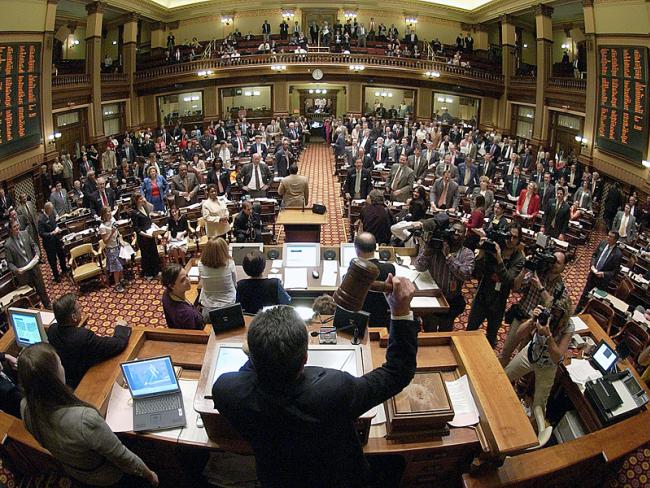By Justin Lewis
Onthe heels of a months-long controversy surrounding two fiercely contentious issues, the Georgia General Assembly is reconvening for another legislative session this year with the hopes of tackling additional pressing topics. During the 2015-2016 legislative session, the state legislature passed two salient bills: House Bill 757, which was aimed at protecting religious leaders in Georgia from performing same-sex marriages, and House Bill 859, which would have enabled individuals to carry firearms on public college campuses. Over the course of a drawn-out period of public outcry from state legislators, college and university officials, business leaders, and citizens alike, it was nearly impossible for Georgia to avoid national attention as these pieces of legislation incited tempestuous reactions. Now, however, with the agenda set to address topics such as medical marijuana and immigration in the new session, one might question whether this year’s legislative priorities are concerned with similar polemic issues.
In 2016, Georgia lawmakers passed House Bill 1, or the Haleigh’s Hope Act – legislation which made Georgians with certain medical conditions eligible to receive medical marijuana. One of the bill’s sponsors, Representative Allen Peake (R – 141), indicated that further action on the state’s marijuana policy is imminent. On Facebook, he posted his intention to “not stop fighting for Georgians to have legal access to safe, lab-tested medical cannabis oil.” Along with Representatives Micah Gravley (R – 67) and David Clark (R – 98), Peake is likely to introduce more legislation that would both widen the pool of citizens eligible to qualify for the current medical marijuana program and facilitate the growth and development of greater quantities of marijuana in the state. Rep. Gravley stated, “We’re faced with the elephant in the room…Even under the current law, if you have a diagnosis and you’re eligible to get what we’ve described in the law, it’s still illegal to get it. You have to break the law to obtain it. We’ll look at a cultivation model for the state of Georgia so people who need this medicine do not have to leave the state.” If the trend of successful marijuana legislation is durable, then this current session could mark another milestone towards access to cannabis oil in the state.
Another major policy objective likely to be considered in the new legislative session focuses on how undocumented immigrants and foreign refugees will be treated by the state. Right now, several bills contain language pertaining to efforts aimed at hindering unauthorized immigrants from having a timely transition into economic self-sufficiency. In particular, one bill seeks to prohibit the legislature from accepting federal funds aimed at helping refugees resettle in the state. Another attempts to impose a fee on individuals – many of which are immigrants and refugees – who make wire transfers to recipients outside of Georgia. Additionally, other legislation would prevent any private universities in noncompliance with state-mandated immigration laws from receiving state funding.
All of these proposals emerge following the surprising victory of Donald Trump in the 2016 presidential election. In light of President Trump’s fervent stance on immigration, numerous Georgia legislators have voiced their sentiments regarding immigration reform. State Senator Joshua McKoon (R – 29), who intends to sponsor some of the aforementioned measures, stated, “If you have got the leader of the Republican Party – who is the president of the United States – articulating similar positions, the attitude of most Republicans is going to be to follow the leadership…[s]o I think all of that points toward a brighter future for these proposals.” Sen. McKoon has also indicated that the federal government ought to have a better system of monitoring refugees who have been resettled in the country. Georgia state Representative Jeff Jones (R – 167), who plans to promote legislation levying a $10 fee for out-of-state wire transfers, mentioned that his endeavor is “pre-Trump.” In defense of his proposal, he asserted, “We’re not targeting the Hispanic community at all…We’re targeting those who are trying to hide the cash transactions.”
Given that then-candidate Trump attracted much attention during the 2016 election season through a plethora of tweets, statements, and remarks on numerous polarizing subjects, who knows what other legislation could arise this session that is at least partially inspired by his expressed views. Added to the dynamic is the existence of a government trifecta, or unified government, at the federal level where Republicans contain control of the presidency and both chambers of Congress. Furthermore, Georgia’s state legislature is comprised largely of Republican legislators on a scale of about 2:1. Combining all these factors, one might reasonably deduce that the Trump Administration will exert a significant level of influence on the nature of legislation that proceeds out of the Georgia General Assembly.


